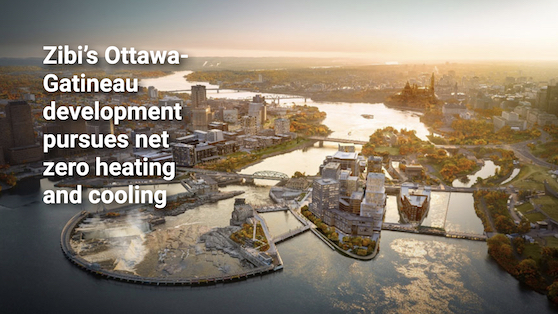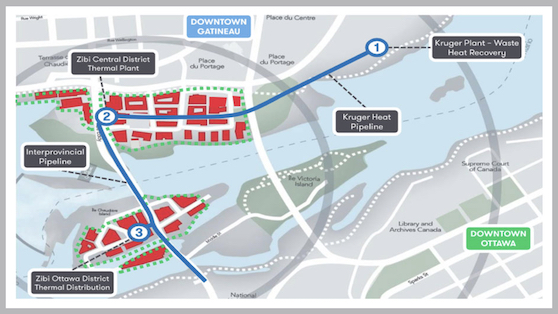
Cleantech
Commercial
Features
In-Depth
Net Zero
News
Residential
Zibi’s Ottawa-Gatineau development pursues net zero heating and cooling
May 5, 2021 By Anthony Capkun
 An aerial view of Zibi District, courtesy Zibi Development.
An aerial view of Zibi District, courtesy Zibi Development. May 5, 2021 – Hydro Ottawa received a $23-million investment through the Federation of Canadian Municipalities’ Green Municipal Fund to create a district energy (DE) system for Ottawa-Gatineau’s Zibi waterfront development.
This DE system aims to help Zibi achieve its environmental objectives of transforming 34 acres of brownfield lands between Ottawa and Gatineau’s urban core into the National Capital Region’s first net zero community.
“Our hope is that Zibi’s Community Utility will not only achieve net zero heating and cooling within Zibi, but also that our project will become a model for communities around the world on how to create innovative partnerships that help them do the same,” said Jeff Westeinde, Zibi president.
The system will eliminate GHG emissions from building heating & cooling operations by leveraging locally generated hydroelectricity, river-coupled cooling from the Ottawa River, and waste industrial heat from the local Kruger Products plant.
Project information
The lead applicant in this initiative is Hydro Ottawa Holdings Inc., and the lead municipality is the City of Ottawa. On top of the $23M investment, the proponents will be loaned $20 million, and receive a $3-million grant.

Waste heat is recovered from the Kruger Plant, transported to the central thermal plant, and used to heat and cool the Zibi District. Diagram provided during original funding application.
The district energy system will be deployed on both the Ontario and Quebec sides of the river, connecting individual buildings to a centralized thermal plant, and coupling to the waste-heat recovery station at an adjacent tissue mill.
Ultimately, the DE system will provide peak heating capacity of 16 MW and a cooling capacity of 6000 tons of refrigeration.
The design is based on low-temperature (±40 C) heating water temperatures which is unprecedented in Canada, according to project proponents, who add “Illustrating that 40 C heat is sufficient for heating purposes in a cold climate is an important precedent for other Canadian municipalities”.
The system overcomes jurisdictional barriers of the Canadian electricity market by moving thermal energy between provinces, using only low-cost Quebec electricity, explain proponents.
“This fact, coupled with unprecedented efficiency and use of post-industrial waste heat, positions Zibi’s low-cost DE system in competition with typical gas-fired Ontario developments,” they add.
Once fully operational, the system will achieve an energy consumption reduction of 27,576 GJ below baseline (61.5%), and water reduction of 8000 m³/year (the DE system’s closed-loop design does not require decentralized cooling towers).
N.B. Background information as provided during original funding application.
Print this page